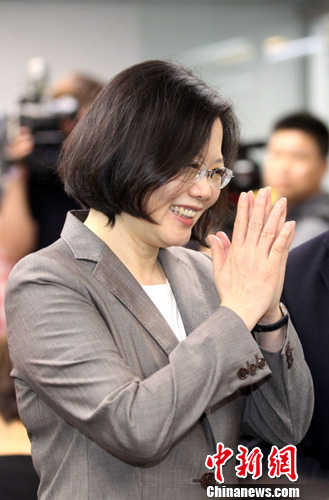


File photo of Taiwan's Democratic progessive party (DPP) leader Tsai Ing-wen (CNS/Chen Xiaoyuan)
'Mainland won't tolerate any vagueness' on whether Tsai endorses one-China principle
A denial of the 1992 Consensus principle that Taiwan and the mainland are both parts of one China would change cross-Straits relations and cause the collapse of the political mutual trust and process of dialogue between the two sides, experts say.
"The island's new leader has to answer whether she endorses the 1992 Consensus - it's not an optional question," Li Yihu, head of Peking University's Taiwan Institute, said on Friday. "The new leader has to voice a clear position on this issue."
Tsai Ing-wen, chairwoman of Taiwan's Democratic Progressive Party, will assume the island's leadership on May 20 and deliver her inaugural speech.
"Cross-Straits relations have come to a turning point," said Li. "The mainland won't tolerate any vagueness regarding the Consensus."
In a front-page commentary on Thursday, People's Daily, the flagship newspaper of the Communist Party of China, stressed that not adhering to the 1992 Consensus constitutes sabotage of the common political foundation for cross-Straits ties.
According to the commentary, the development of cross-Straits relations in the past two decades has proved that the relations have a bright future with the endorsement of the Consensus. And without it, the peaceful development of the relations would be off course and could founder, it said.
"It is very rare for People's Daily to have a commentary like this on its front page," said Li. "The article shows the central leadership's firm position on this point. It's an official message and a powerful statement."
Li said the mainland has reiterated the importance of the Consensus and the serious consequences of not adhering to the principle.
"Economic loss is obvious, and the political impact would be inevitable," he said. "All the consequences would have to be borne by the Taiwan leadership."
But the island's new leader has been trying to skirt around the issue, said Ni Yongjie, deputy director of Shanghai's Taiwan Research Institute.
"Tsai did say she would prefer preserving the status quo. But without the Consensus, the status quo would not exist," he said, adding that Tsai could use the opportunity on May 20 to explicitly endorse the Consensus.
Zhu Songling, director of the Institute of Cross-Straits Relations at Beijing Union University, said the mainland has been unequivocal and has warned that further development of cross-Straits relations would be set back by its denial.
"Tsai's dodging of inquiries about her position on the Consensus is actually destroying cross-Straits ties," he said.
 Beijing Style: ready for bare legs
Beijing Style: ready for bare legs Century-old station sees railyway evolution
Century-old station sees railyway evolution Amazing scenery of Xisha Islands
Amazing scenery of Xisha Islands Enthusiasts perform Kung Fu at Wudang Mountain
Enthusiasts perform Kung Fu at Wudang Mountain Stunning photos of China's fighter jets in drill
Stunning photos of China's fighter jets in drill Monk's mummified body to be made into a gold Buddha statue
Monk's mummified body to be made into a gold Buddha statue Asia's longest and highest suspension bridge to open to traffic
Asia's longest and highest suspension bridge to open to traffic China's first interactive robot looks like a beauty
China's first interactive robot looks like a beauty Vietnamese Su-30 fighters fly over Nanwei Island in South China Sea
Vietnamese Su-30 fighters fly over Nanwei Island in South China Sea Top 20 hottest women in the world in 2014
Top 20 hottest women in the world in 2014 Top 10 hardest languages to learn
Top 10 hardest languages to learn 10 Chinese female stars with most beautiful faces
10 Chinese female stars with most beautiful faces China’s Top 10 Unique Bridges, Highways and Roads
China’s Top 10 Unique Bridges, Highways and Roads Unpredictable Trump could swing either way on China
Unpredictable Trump could swing either way on China Military institution scandal highlights shady Putianese private clinics
Military institution scandal highlights shady Putianese private clinics How to maintain property in communist system looms large as land warrants expire
How to maintain property in communist system looms large as land warrants expire Yiwu, China’s wholesale capital, switches its economic growth engine from manufacturing to design
Yiwu, China’s wholesale capital, switches its economic growth engine from manufacturing to designDay|Week